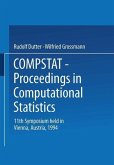The growing complexity of many real world problems is one of the biggest challenges of our time. The area of international finance is one prominent example where decision making is often fraud to mistakes, and tasks such as forecasting, trading and hedging exchange rates seem to be too difficult to expect correct or at least adequate decisions. From the high complexity of the foreign exchange market and related decision problems, the author derives the necessity to use tools from Machine Learning and Artificial Intelligence, e.g. Support Vector Machines, and to combine such methods with sophisticated financial modelling techniques. The suitability of this combination of ideas is demonstrated by an empirical study and by simulation.
Dieser Download kann aus rechtlichen Gründen nur mit Rechnungsadresse in A, B, BG, CY, CZ, D, DK, EW, E, FIN, F, GR, HR, H, IRL, I, LT, L, LR, M, NL, PL, P, R, S, SLO, SK ausgeliefert werden.
Hinweis: Dieser Artikel kann nur an eine deutsche Lieferadresse ausgeliefert werden.









